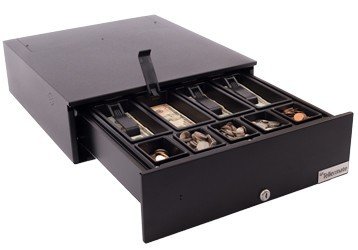 As the company that kickstarted the whole count-by-weight category, Tellermate have played a part in shaping the language of cash management. But, it occurred to me recently that while cash management and cash handling processes in different countries may be similar, the terms to describe them have evolved independently. So what are the differences in the terminology, what does each mean, and should we refer to this year’s break through cash management technology as an Intelligent Cash Drawer, or a Smart Till?
As the company that kickstarted the whole count-by-weight category, Tellermate have played a part in shaping the language of cash management. But, it occurred to me recently that while cash management and cash handling processes in different countries may be similar, the terms to describe them have evolved independently. So what are the differences in the terminology, what does each mean, and should we refer to this year’s break through cash management technology as an Intelligent Cash Drawer, or a Smart Till?
Tellermate are best known for producing count by weight cash counting devices- so much so that customers often refer to these devices as ‘a Tellermate’. But even that cornerstone of cash management is known by different terms across the world e.g. a money counter or even a currency scale.
After pondering this I started noticing other differences in how countries across the world talk about their cash management and began to note down these terms and their meanings…
The world of cash does not stay still for long. And as new categories in cash counting emerge, so new terminology is needed to describe what it does. For example, as Tellermate technology is becoming embedded at the checkout, we notice English-speaking North America using the term Intelligent Cash Drawer. Where a term often used in the UK is a Smart Till. But, search for Smart Till in the US and it will lead you instead to farming equipment.
 Well, a standard or “dumb” cash drawer is simply a box that has separate compartments for coins and bills of different denominations with a sliding or flip-top opening mechanism. But a Smart Till or Intelligent Cash Drawer, such as Tellermate’s LiveDrawer uses ‘count by weight’ technology to give a real-time view of the amount of coins and bills (notes in the UK) contained in the drawer at any one time. So is the Tellermate LiveDrawer an Intelligent Cash Drawer or a Smart Till – actually it’s both.
Well, a standard or “dumb” cash drawer is simply a box that has separate compartments for coins and bills of different denominations with a sliding or flip-top opening mechanism. But a Smart Till or Intelligent Cash Drawer, such as Tellermate’s LiveDrawer uses ‘count by weight’ technology to give a real-time view of the amount of coins and bills (notes in the UK) contained in the drawer at any one time. So is the Tellermate LiveDrawer an Intelligent Cash Drawer or a Smart Till – actually it’s both.
What about an Intelligent Cash Environment then? Well the ‘Intelligent Cash Environment’ is a complete solution of hardware (the intelligent cash drawer) and software that integrates with existing PoS systems, creating a full audit trail of cash as it moves around a store. And the benefits go way beyond being able to catch cash discrepancies or replenish change. Indeed the longer term data-mining possibilities may well give birth to new KPIs and new terminology.
And when it comes to the day-to-day cash processes, there are also some clear differences here. Skim or lift; float or bank, cashup or closeout – there are many established terms for the same function from countries from the United States to Europe. This can present a challenge for multi-nationals with interests in both Europe and North America – either they impose their terminology across the organisation or risk running two sets of terminology in parallel.
One term that seems to be in use in across both the US and the UK is shrink or shrinkage. However, even here, there seems to be no clear consensus of what is meant as its scope covers so many functions. The best definition I can find is ‘Intended income that was not and cannot be realized’ – as defined by ECR Europe.
Finally, I’m sure that most people will associate the term Tellermate with the traditional bank teller, but where does that term come from? As a Dutch speaker, I immediately thought of the term ‘teller’, which means…‘counter’. Surely more than just a coincidence.